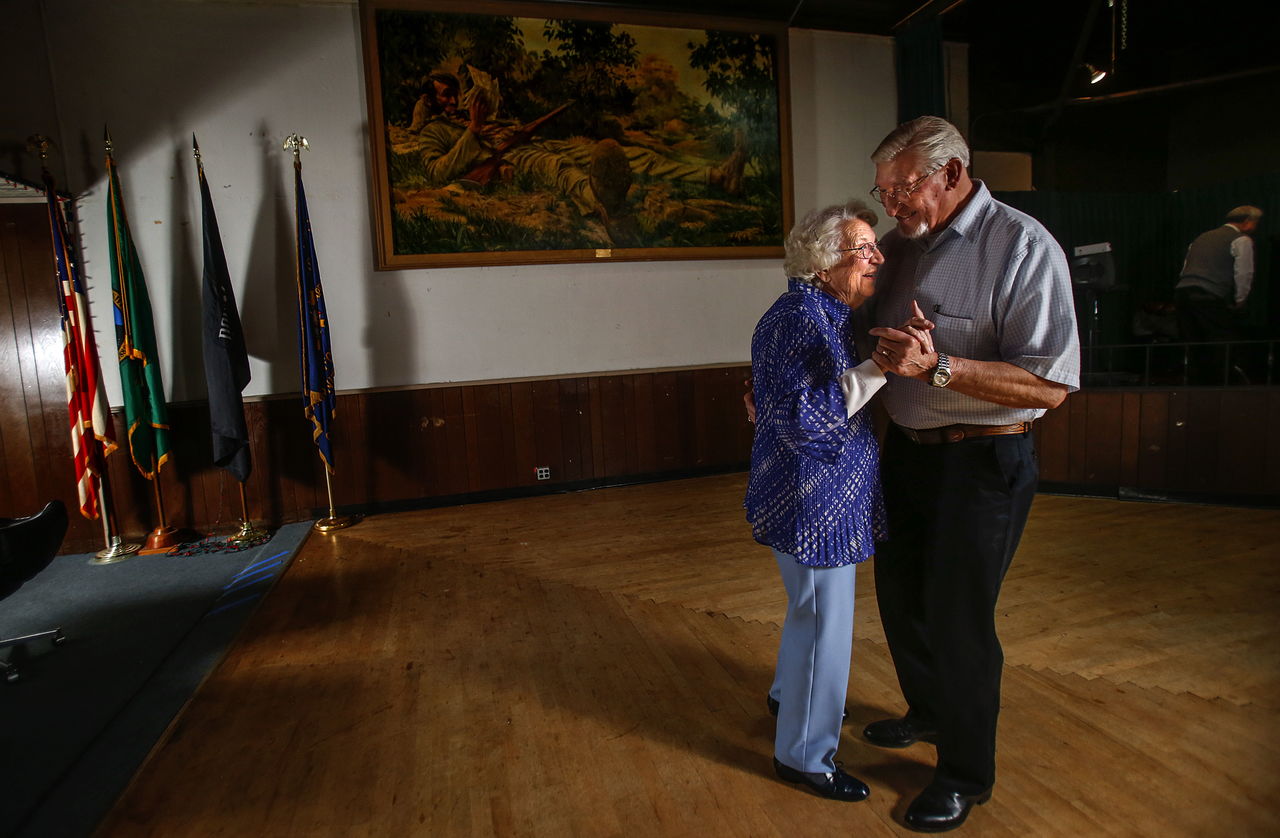EVERETT — Rita Jozefczyk is drawn to another time. Going through old photographs, she drifts back nearly 75 years to life on the home front during World War II.
There she is, a fresh-faced teenager in an overcoat standing with her father, Earl Davidson, a slim man in uniform.
There is her uncle, John Paul Boland, posing with fellow Marines after the Battle of Iwo Jima.
There are pictures of the Mukilteo woman’s three other uncles, Bill, Leonard and Camillus “Fritz” Boland. Each was away at war — and now all are gone.
About 430 American veterans of World War II die each day, according to the U.S. Department of Veterans Affairs. During the war, 16 million Americans served their country. Fewer than 700,000 survive today, including about 18,000 in Washington. The VA statistics are on the website of the National WWII Museum.
For decades, those veterans have shared harrowing memories of war in the Pacific and in Europe.
Jozefczyk, 88, is a voice for all who struggled on the home front, yet found ways to serve their country.
“We all adjusted to living during wartime. I was about 15 at the time,” said Jozefczyk, who on Wednesday was at the Veterans of Foreign Wars Post 2100 in Everett.
She and her husband, 83-year-old Stan Jozefczyk, are regulars on the VFW dance floor. In a scene evoking the 1940s, they swayed to the music of the Eddy Fukano Band, a group that performs vintage favorites at VFW dances 7 to 10 p.m. every Wednesday. Stan Jozefczyk is a Korean War veteran.
A Montana native, during the war Rita Jozefczyk lived with her mother and younger brother, Robert, in government housing near Fort Lewis. She was then Rita Davidson. Although still a girl, she worked with her mother, Violet Boland Davidson, in the massive Mount Rainier Ordnance Depot at Fort Lewis.
“Rosie the Riveter” was the iconic image of women workers during World War II. There was also a wartime poster of a woman, in coveralls and a head scarf, that said “She’s a WOW, Woman Ordnance Worker.”
“My mom worked in a huge warehouse. She was in the bearings department,” said Jozefczyk, explaining that her mother helped supply bearings for tanks, gun turrets, trucks and other military goods being shipped overseas. She recalled her mother using cosmoline, a waxy substance that prevented rust on guns, tanks and other equipment during long sea voyages.
“She was so good in the cosmoline area, they called her ‘Ace,’ ” said Jozefczyk, whose own ordnance depot job was fixing the labels to items that were shipped. Sometimes, Jozefczyk said, she included a personal note with a label: “God bless you.”
The family lived at American Lake Gardens, a government housing project built next to Fort Lewis for civilians working at the ordnance depot. Their only heat was a little stove that burned lumps of coal. The place had paper-thin walls, and an ice pan for the icebox had to be emptied.
Among her mementoes are ration books filled with stamps for shoes, meat and other items in short supply during the war. Jozefczyk remembers women using pencils to draw “seams” on the backs of their legs because they couldn’t get nylon stockings.
“You learned to do things,” she said. For a time, she took a bus to Tacoma to work in a meat market. With the scarcity of meat, the owners sometimes sent her home with a small package for her family’s meal.
“Everybody was kind, and we all helped one another,” Jozefczyk said.
With Memorial Day almost here, Jozefczyk thinks back to the sacrifices her uncles and father made, and to the lasting toll of war.
Jozefczyk has never forgotten her thrill at seeing her dad get off the bus that brought him home in late 1945. Some of her mother’s brothers struggled to find work after the war, and one died while home on leave.
As much as she honors their sacrifices, she is also in awe of the strength and faith her mother showed at home.
Before joining her husband on the dance floor Wednesday, Jozefczyk unfolded a tattered front page from The Tacoma News Tribune. The newspaper is dated Aug. 15, 1945, Victory Over Japan Day.
“PEACE!” the huge headline says. “Cheers, Tears and Devout Thanksgiving Greet Peace News Here.”
Nearly 71 years later, the gratitude endures.
Julie Muhlstein: 425-339-3460; jmuhlstein@heraldnet.com.
Talk to us
> Give us your news tips.
> Send us a letter to the editor.
> More Herald contact information.
























